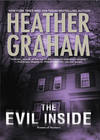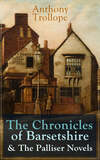Loe raamatut: «The Evil Inside»

Praise for the novels of Heather Graham
“Graham expertly blends a chilling history of the mansion’s former residents with eerie phenomena, once again demonstrating why she stands at the top of the romantic suspense category.”
—Publishers Weekly on Phantom Evil, starred review
“An incredible storyteller.”
—Los Angeles Daily News
“A fast-paced and suspenseful read that will give readers chills while keeping them guessing until the end.”
—RT Book Reviews on Ghost Moon
“If you like mixing a bit of the creepy with a dash of sinister and spine-chilling reading with your romance, be sure to read Heather Graham’s latest… . Graham does a great job of blending just a bit of paranormal with real, human evil.”
—Miami Herald on Unhallowed Ground
“The paranormal elements are integral to the unrelentingly suspenseful plot, the characters are likable, the romance convincing, and, in the wake of Hurricane Katrina, Graham’s atmospheric depiction of a lost city is especially poignant.”
—Booklist on Ghost Walk
“Graham’s rich, balanced thriller sizzles with equal parts suspense, romance and the paranormal—all of it nail-biting.”
—Publishers Weekly on The Vision
“Mystery, sex, paranormal events. What’s not to love?”
—Kirkus Reviews on The Death Dealer
The
Evil Inside
Heather Graham

For Lisa Manetti, Corinne De Winter, Brent Chapman, Juan Roca, Dennis Pozzessere, Jason Pozzessere, Dennis Cummins, and all our group, and the amazing scares and laughs we all shared at the Lizzie Borden House. (And thanks to the house’s beautiful current owner!)
In memory of my in-laws, Angelina Mero and Alphonso Pozzessere; I can’t think of Massachusetts without thinking about them, and smiling.
And in memory of Alice Pozzessere Crosbie and “Uncle Buppy,” and for the Crosbie clan, Steven, Ginger, Linda, Tommy, Billy, and Mary, and their families.
And for the great, diverse state of Massachusetts. Especially Gloucester, and Hammond Castle, where Derek and Zhenia had the most beautiful wedding ever.
Prologue
The boy stood naked in the middle of the road.
Sam Hall’s headlights caught him there, frozen in position, like a deer. He was covered in something slick, and it dripped down his flesh. It looked reddish, like blood, as if the kid had run off the set of a horror movie after being drenched in buckets of the stuff.
Sam slammed his foot on the brake pedal, grateful for once that his years with Mahon, Mero and Malone had given him the ability to afford the new Jaguar with the stop-on-a-dime brakes.
Even then, the car pulled to a halt just inches before the boy.
Swearing softly beneath his breath and puzzled beyond measure, Sam jumped out of the car. “Hey, what the hell are you doing there, son?”
The boy didn’t move, didn’t seem to realize that he’d nearly been roadkill. He just shook as he stood there. Summer had recently turned to fall, and the air had a sharp nip, typical for Massachusetts at this time of year. Tree-laden tracts lined the road; the old oaks seemed to bend and moan with the breeze, while multicolored leaves danced on the road and swept around the scene as if they, too, were deeply disturbed.
The boy didn’t acknowledge Sam or look at him.
Again Sam swore softly. There was obviously something really wrong, though this kid couldn’t have been injured severely and still be able to stand as he was.
He couldn’t have lost that amount of blood and still be conscious.
Was it really blood … couldn’t be.
Either way, Sam couldn’t leave him in the middle of the road.
He looked at the new Jag he really loved, with the leather seats he also loved, and walked around to his trunk and found the beach blanket he’d picked up on his recent drive to the Florida Keys. It was sandy, but it would warm the kid.
He returned quickly, but the kid hadn’t run off, much less moved. “Are you hurt?” he asked quietly.
He received no response.
“Here, here, you’re going to have to get into my car,” Sam said, approaching the boy with the blanket. “We’ll get you to a hospital.”
Sam wrapped the blanket around him. “Sorry about the sand,” he said.
The kid looked to be somewhere between fifteen and seventeen, but underdeveloped. He was painfully thin. His eyes were huge and brown in the lean contours of his face. His chest was devoid of hair, so most of the blood had slid down his chest.
The temperature seemed to be around forty degrees Fahrenheit. It wasn’t freezing, but the kid shouldn’t be exposed to this long.
Sam intended to get him into the car. And yet, as he stood there, trying to be compassionate while saving his wool coat from the sticky red substance that looked like blood, he suddenly froze.
It didn’t just look like blood—it was blood.
Denial rushed through his mind.
But it was blood, no denying it.
Pig’s blood, cow’s blood … hell, rabbit’s blood.
But something told Sam that it was not.
He drew the blanket off the boy and turned him around, seeking an injury that might have caused that amount of blood.
But he didn’t find any. If he had, the boy wouldn’t have been standing upright. He wouldn’t have been breathing. He’d have been dead from a wound like that.
He’d already wrapped the blanket around the kid. No undoing that.
And if he could, would he leave the kid there shivering with nothing?
Still standing in front of the boy, who didn’t even reach up to hold the blanket in place, he fumbled in his pocket for his cell phone and hit 911. An operator with a droning voice asked him what his emergency was.
“My name is Samuel Hall. I was driving into Salem when I nearly hit a young man in the road. He’s covered in blood. It doesn’t appear to be his blood, but I can’t be certain that he isn’t injured. He’s standing on his own, and doesn’t seem in any way to be too weak to do so, but he’s nonresponsive. He may be in shock. Can you get someone out here—fast?” He looked around and quickly gave his position as best he could. Hell, it was a quiet backwoods road. He’d opted to take IA north from Boston, but had turned off early. The dark, quiet road through the trees had seemed a soothing path for his first visit home in a long time.
“Stay calm now, Mr. Hall,” the operator told him. “I’ll have a car out to your position immediately. Patrolmen are in the vicinity. It won’t be long. You’re sure the young man isn’t bleeding? If so, you must stanch the flow of blood. Stay calm. Are you doing all right?”
He hesitated for the fraction of a second, staring at the phone, his mind racing. He thought of the horrors he had witnessed in the military, and he thought of the crime-scene photos he’d studied as a criminal attorney.
“Ma’am,” he said, his voice even and strong, “I’m about as calm as a dead Quaker. But you need to get someone out here fast. I’m going to suggest you send an investigator, because I have a feeling this might be human blood, and I don’t want to compromise any more evidence than I already have by putting my blanket around the boy.”
“Of course, sir. Please remain on the line. And do your best to remain calm.”
“If you tell me to remain calm one more time, I’m going to implode and become consumed by spontaneous combustion—”
“There’s already a car on the way. Sir, you just have to remain calm. This is Salem, Massachusetts, sir, and we are moving into the Halloween season now, you know. You may be the victim of prank. Now, stay on the line, and remain calm, Mr. Hall.” She gasped suddenly, her well-learned rhetoric failing her for a moment. “Oh, you’re the Sam Hall—”
He heard the sound of a siren then. “They’re here” is all he said. “Thanks.” He hit the end icon on his phone.
A patrol car pulled up on the road in front of him, and the glare of its lights met and mingled with the Jag’s headlights, almost blinding him for a minute. Two uniformed officers exited from either side of the car, guns in position.
“He’s not armed!” Sam called. “He’s—he’s in shock. He needs medical attention.”
“An ambulance is on the way,” the driver called out. “And Detective Alden. I radioed him on my way out.”
Alden? He wondered if it was his old friend John. Puritan names still abounded here, and John Alden and he had been on the football team together. John had always wanted to be a cop, a detective, actually. He must have worked his way up through the ranks.
The patrolmen walked forward, slowly holstering their guns as they saw that the shaking youth carried no weapon and that Sam seemed nonthreatening, as well.
“Patrolman Nathan Brewster,” one said, introducing himself. “And my partner, Robert Bishop.”
Sam nodded. “Samuel Hall,” he said, but the patrolmen were just staring at the boy. They glanced at each other uneasily.
“Yeah, yeah, Detective Alden is on his way. Any minute now,” Brewster said, almost as an afterthought.
“What’s going on?” Sam asked. The two were behaving curiously. They had holstered their weapons but appeared ready to spring for them again at any second.
Neither touched the boy. Neither spoke to him. The kid was shaking harder and harder, despite the blanket Sam had set around his shoulders. Neither did the boy make any attempt to hold the blanket to his bony frame.
Again, the two exchanged glances. “We’re not really at liberty to say, sir.”
“Fine, well, I think we have to get him into a heated car, or he’ll die of exposure pretty soon,” Sam said. True or not, he couldn’t bear watching the shocked youth stare wide-eyed at nothing and shake anymore.
But before the patrolmen were compelled to respond, the sound of sirens suddenly seemed to grow to an alarming pitch. First on the scene was an unmarked car. A grim, solid-looking man of about fifty in a worn woolen coat and plaid sweater exited the driver’s side of the car and strode quickly toward them.
Plainclothes cop. Detective, Sam thought. He hoped it was John.
And it was.
But unlike the others, he didn’t pull a weapon. He hurried forward, passing between the patrolmen and Sam and the youth. He didn’t look at Sam, but at the boy, and his expression wasn’t authoritarian or harsh, but sad.
“Malachi,” he said. “Good God, Malachi, you’ve done it now.”
“Excuse me. He’s shivering. He’s freezing. He’s in shock. John? It’s Sam—Sam Hall.”
John Alden turned and looked at Sam.
“Sam!”
“I was on my way to the folks’ place. I nearly hit the boy. He was just standing there, in the road. Covered in blood.”
“Sam,” Alden repeated.
He looked as if he was about to say good to see you or something to that effect, but in the road with a blood-splattered boy, it just wasn’t appropriate.
“John, this kid needs help. I think he’s in shock,” Sam repeated.
John Alden nodded and indicated, with the cast of his head, the ambulance that had arrived. “Yeah, he’ll get medical attention. And he’s in shock, you say? He should be. He just hacked his family to death.”
1
Lexington House.
There it stood, on a cliff by the water. It might have been a postcard or a movie poster, and it was as eerie as ever—a facade that graced the darkest horror movie. Its paint was chipping, the exterior was gray and it had been weathered through the centuries by icy winds ripping in off the Atlantic Ocean. The ground-floor windows seemed like black eyes; the second-floor windows might have been startled brows, half covered by the eaves of the roof.
Oddly enough, Lexington House had always remained in private hands. From its builder—the Puritan Eli Lexington—to its recent owner—the now deceased Abraham Smith—it had always found a new buyer after each and every one of its tragedies. People had once known its early history, of course, but that had been lost amid the witchcraft trials that scarred American history and continued to fascinate the social sciences. And when Mr. and Mrs. Braden had been brutally murdered two centuries later, in the 1890s, the world knew that their son had been guilty of the crime. But the legal system had worked for the killer this time, and he’d been acquitted. He and his sister had promptly sold the house to another private party. Eighty years later it had become a bed-and-breakfast, and then it had been purchased by Abraham Smith, who had longed for the property on its little cliff, segregated from all but a few neighbors.
One of whom had been murdered last week.
And now today …
Jenna Duffy had heard about nothing but the Lexington House on the radio since she’d started for Salem from Boston this morning. Uncle Jamie had called her days before, begging that she come to Salem and speak with him. Peculiar timing.
She’d pulled to the side of the road and parked to stare at the place.
A patrol car sat near the house; crime-scene tape cordoned off the entire house. There were no onlookers, though. The house was at a little distance from the historic section of town, where most visitors strolled through the Old Burial Ground, visited the House of the Seven Gables or sought out history at any one of the witch museums or the Peabody Essex Museum. And since it was October and Halloween was approaching, the real-life contemporary tragedy would fuel the ghost stories that were already being told around town.
She stared at the house awhile longer, wondering about its history. What happened at Lexington House would prove to be another horrible case of mental instability or greed, and as much as she longed to actually see the property that brought about such gruesome tragedy, she had a meeting with her uncle. She glanced at her watch and pulled back onto the road. With Halloween tourists clogging the city, it might take her time to get where she was going.
Somehow she was still early.
She parked her car at the Hawthorne Hotel’s parking lot, and wandered across the street to the common.
Autumn leaves, beautiful in their warm orange, magenta and yellow colorings, rustled beneath Jenna’s feet as she strolled. Before her and around her, the leaves swirled and lifted inches into the air as the breeze picked them up and whimsically tossed them about.
She heard the laughter of schoolchildren as they made their way through Salem Common, heading home but not too quickly. Autumn was certainly one of the most beautiful seasons in New England, and schoolchildren, raised with all the colors as they may have been, still loved to stop and lift the leaves, toss them about and roll in them.
Jenna had loved Salem since she’d first come to the States and her parents had chosen nearby Boston, Massachusetts, as the place to begin their new lives. They had come up here weekends, in the summers and for the Halloween festivity, and also for the fall leaves and to see Uncle Jamie.
But this was a difficult visit. She was about to meet Uncle Jamie at the Hawthorne Hotel, and she was worried about him. He’d been so anxious when he’d asked her to come. He was asking her in a professional capacity, but he didn’t want her bringing “your team” or “your unit” or “the official group” with which she worked, not yet.
As she walked across the common, her attention was drawn back to the children. A group of five- to seven-year-olds were holding hands, running in a circle and playing a game.
She froze as she heard them reciting the old rhyme repeated not just in this area, but around the country.
Oh, Lexington, he loved his wife,
So much he kept her near.
Close as his sons, dear as his life;
He chopped her up;
He axed them, too,
and then he kept them here.
Duck, duck, wife!
Duck, duck, life!
You’re it!
Jenna felt as if ice water had suddenly been injected in her veins—the old ditty now seemed to be words of mockery and cruelty. A young woman, who had been standing with another group of parents watching over small children and a group of older teens who had gathered in the park, rushed forward. She caught hold of the little boy’s arms, spun him around and shook a finger at him, reprimanding him.
Another of the mothers came hurrying over to her, her voice carrying in the cool air. “Cindy, don’t be so hard on them! They don’t … know. We used to say that rhyme all the time when we were kids.”
“Samantha, I know, it’s just that … now? Now, with what’s happened again? It’s that house! That horrible house, and that boy … He used to go to school with our kids.”
“But, it’s over now, Cindy. It’s over. They have the boy in custody.”
Other parents began calling out sharply to their children. The two women herded the children toward the group of parents. A tall man in the group said something sharply to the teens, words that Jenna couldn’t quite hear, and they disbanded, as well. The conversation they all exchanged became whispers. The families and the unattached teens began to drift away, as if none of them wanted the reality of the situation.
The great seafaring days of Salem were in the past. The city survived on tourism, and most of it wasn’t because of the autumn leaves. Salem had been the site of the infamous Salem Witch Trials—and it had also been the site of two horrendous and savage murdering sprees.
And, now, a third.
Tragic incidences of human ignorance and brutality in the past were one thing; bloodletting in the present was quite another, especially with the town anticipating the season’s mammoth number of visitors. The income generated by the holiday alone could sustain many a shopkeeper and inn through the brutal New England winter to follow.
Of course, for Uncle Jamie, the recent tragedy would not be in any way fiscal but personal. She knew Jamie and loved him dearly, because he was a man who took the troubles of others to heart. This was often to his own detriment, but that was Jamie.
From her vantage spot, she could see the Salem Witch Museum with its English Gothic facade across the street on North Washington Square—the point where she always told friends to begin their exploration of the city. In a comparatively short presentation, the museum did a fine job of explaining the climate of the city during the days of the infamous trials. The statue of Roger Conant, town founder, stood proud before her as well, larger than life, his heavy cape appearing to blow in the same breeze that tossed the leaves about.
The residences and businesses surrounding the common were decked out for fall. Pumpkins and black cats adorned windows and lawns, while skeletons and, naturally, witches dangled from branches. Some people were more into the traditional concept of fall itself, and they had decorated with scarecrows, feathered turkeys and cornucopias. The image of the city of Salem she saw as she stood in the common was that of old New England, family and festivity, tinged with the strange pleasant warmth of the coming of fall.
She glanced at her watch again. It was time to go and meet Uncle Jamie; she suddenly realized she had been dreading the meeting, and she didn’t even know why.
Sam poured himself a second cup of coffee and looked around the house, trying to concentrate on its details and trying to make up his mind. He didn’t like wondering what the hell he was going to do about the house, but it was better than thinking about the bizarre and tragic circumstances under which he had finally made it home.
He didn’t need to get involved—he wasn’t staying here. He’d already taken a nice long leave of absence, and it was time to go back to work. But, then, he mused, maybe he shouldn’t. He’d not only saved his client from prison, but he’d proved beyond a doubt that the man not only deserved to be declared innocent, but was, in fact, innocent. And he was still a bit worn down from all the effort.
Sam had really stepped on every rung of the ladder on his way to becoming a renowned attorney. He’d worked in the D.A.’s office following college and the military. He’d worked as an investigator as well before joining his first small firm, because his boss had needed an investigator more than another attorney in the office. He’d learned the ropes from Colin Blake, Esquire, and he’d come to terms with a sad truth: a defense attorney was still required to give his best effort in a legal defense, even if he thought his client was guilty as all hell. He’d learned to make the cops and the prosecutors suffer, but discovered he didn’t much like that side of the business. Still, despite that, he wasn’t sure he could ever go back to being a prosecutor. It wasn’t the money. Well, it was about money. Often. It was sometimes about the money it took to put together a great team of defense attorneys. He’d seen a young woman sent to prison for years, convicted of the murder of her newborn. He’d seen a rich young man walk on drug charges, and a poor one sent up fifteen years for the same offense. He understood the law; he didn’t understand why the slow wheels of Congress took so long to correct the inequities that were to be found in so many instances. He was violently opposed to the death penalty, always afraid that somewhere, sometime, it would send an innocent person to his or her death, and yet he understood the desire others felt to see it utilized. Too many drug lords, murderers and rapists made it back onto the street. But last night …
Something about the kid he’d come upon in the street was still tugging at his heartstrings.
The kid, according to police, had axed his family to death.
There was no doubt that Malachi Smith’s father, mother, grandmother and great-uncle had been murdered, and horribly so. Jumping on the internet that morning, he’d seen that the news regarding the killings had gone global. Abraham Smith, sixty-two, Beth Smith, fifty-nine, Abigail Smith, eighty-three, and Thomas Smith, eighty-seven, had all died from exsanguination—Beth, Abigail and Thomas all receiving at least eight blows from a honed ax, Abraham over twenty. The previous week, a neighbor, Mr. Earnest Covington, had been found hacked to death on his parlor floor. Six months earlier, a Salem native living in nearby Andover had been found murdered in his barn. Police had been following leads and now suspected that the cases were related.
Indisputable evidence indicated that the youngest son of the Smith family, Malachi, was the killer. The police had the young man in custody, and he remained under guard in isolation at a correctional facility hospital.
The Smiths were the current owners of Lexington House, famed for its bloody reputation. The family had adhered to strict fundamentalist teachings, being members of the Old Meeting House in Beverly, Massachusetts. This was a strange connection of sorts with the original murders in the place. In the midst of the witchcraft trials, Eli Lexington had murdered his family with an ax. He’d been imprisoned with the nearly two hundred arrested for witchcraft at the time. Then he disappeared. There were no records of his fate after prison.
Then, in the late eighteen hundreds, Mr. and Mrs. Braden had been killed in the house, as well. A historical parallel of the Menendez case? From the books, movies and court records that had come down through time, it appeared that a disgruntled son had killed his parents for the money. And, of course, similar cases had been suspected elsewhere. The Braden case was similar, too, to the Lizzie Borden murders. Both Lizzie and the Braden boy had been acquitted, but nobody doubted that each of them had murdered their families.
Just like today’s case.
Sam told himself over and over to get the hell away from his computer. He was not involved. But he was.
He’d found the kid in the road.
And, he’d grown up in Salem. He could still remember being a school kid, and the rhyme every school kid in the area had learned. Oh, Lexington, he loved his wife …
A good attorney, of course—even a hack—would go for an insanity plea. The kid had grown up in what everyone in the area termed a haunted house—a really haunted house—which, in a city like Salem, was saying something.
Any attorney could defend the boy. It was too easy. He forced himself to leave the computer screen and walk around the house.
His parents had been dead for nearly two years; he’d returned for the funeral, and he hadn’t been back since. The house, however, was in excellent shape. His father, until his death, had seen to it that no electrical wires frayed, that the heating system was state-of-the-art and that every board that even seemed slightly damaged was replaced. His father’s friend and contractor, Jimmy Chu, had kept the house in good repair during the two years. His dad had come from old Puritan stock, and he’d considered it an honor to care for the home that his parents had owned, just as his grandparents before them did. It wasn’t one of the oldest houses in the area, but it ranked right in there with many of the homes surviving from the turn of the eighteenth century all the way into the twenty-first.
He smiled suddenly, shaking his head and taking a sip of the coffee he still held, untouched. “Darn you, Dad. You knew that I won’t be able to sell the damned thing!”
A house—in a city in which he no longer lived—was a pain in the ass, no matter what. He guessed that his father had always figured he’d come home one day.
Well, he’d managed to, but on the wrong damned day. He dropped his head. He didn’t want to be involved with a legal situation here.
But he couldn’t blink without seeing in his mind’s eye the blank brown eyes of the naked boy covered in blood and shaking on the road.
“Jenna!” Uncle Jamie drew her to him, giving her a warm and emphatic hug.
She hugged him in turn. She loved Jamie. She loved her family in general. Despite their long history of warfare, the Irish were an exceptionally warm, passionate and profuse people. They were full of magical tales, and they seldom felt obliged to refrain from speaking their minds.
“Uncle Jamie!” she said.
He pulled her away for a moment, holding her at arm’s length to study her. Jamie had brilliant green eyes and graying auburn hair. He was her mother’s younger brother, and had always had a mischievous side to him, making him very popular among children. He was so devout that he’d nearly gone into the priesthood, but had decided at the last minute that he didn’t really have the calling. He’d attended medical school and become a psychiatrist instead.
“You look good, my girl, aye, that you do! Pretty thing, you always were. Beautiful eyes, green like Eire, and hair like fire—you got my sister’s temper to go with it, eh?” Her own accent had become little more than a hint of a different place, but she had come to the States when she’d been a young teen. Jamie had been a grown man.
“Mum’s temper isn’t that bad, Uncle Jamie. She’s a lot like you—opinionated.”
He grinned. “Come over here, I’ve a booth for us,” he told her. He slipped an arm through hers, leading her toward a corner booth. “Lovely, lovely, isn’t it? I’ve always loved this city. You have the Wiccans with their wonderful shops—and their Wiccan gossip and squabbles, of course! You’ve got the immigrants and the old Puritan families, and all of them getting along—and not. But fall here is the most wonderful season in the world—everyone loving life and creating cornucopias and carving out pumpkins.”
“Yes, I love it here, too, Uncle Jamie.”
He looked around and motioned to the waitress. “What will you have, niece?”
She was surprised to feel a sudden chill. Jamie was hedging, and he usually just spoke plainly. It was unusual that he’d dawdle by ordering like this, but she decided she’d let him talk at his own speed. “Something warm,” she replied.
“An Irish coffee?” he suggested.
“Why not?” she said.
Their waitress was wearing a cute, short-skirted pirate costume. Jamie asked to make sure that the bartender used Jameson Irish whiskey, and that they didn’t go putting a wallop of “white stuff”—whipped cream—on either drink. The waitress smiled. “Jamie, you order the same thing every time you come in.”
“So I do,” Jamie told her, grinning. “But, still, a man’s got to be careful when he orders his drink.”
Laughing and shaking her head, the waitress moved on with a swish of her short skirt.
“They do get into Halloween early, don’t they,” Jenna murmured.
“Well, you know the whole pumpkin-carving thing is Irish, of course,” Jamie said.
“I know, Uncle Jamie …” she said to the familiar information, knowing it wouldn’t stop him. She thanked the waitress as she delivered their drinks. Jamie didn’t seem to notice.
“It all came from Stingy Jack,” Jamie said, studying his cup, and speaking to himself more than her.
“A myth about a man named Stingy Jack,” Jenna reminded him.
He waved a hand in the air.
“The devil invited old Jack to have a drink with him, and Jack, he wasn’t about to pay for the drinks, but then neither was he about to turn one down. So, our Jack, he tells the devil that he must turn himself into a handful of coins to pay for the drink. But, thirsty though he was, Jack was a clever boy, and put the coins in his pocket, around his silver cross, and the devil, next to that cross, couldn’t turn himself back into the devil, not next to the holy relic! Finally, though, Jack let the devil return to his old self—long as he didn’t bother Jack for a year and a day—and would not claim his soul if he should die. There are stories of Jack playing a few other tricks on the devil over his lifetime. Eventually, of course, he did die. And when he did, the Good Lord would not let him into Heaven, and the devil could not claim his soul, and so he was sent into the dark of the night with only a burning lump of coal to light his way. Well, Jack found a pumpkin, carved it out, and carried it about endlessly through the darkness of the night. And so he was called Jack of the Lantern, and finally, Jack-o’-Lantern.” He paused to take a gulp.
Tasuta katkend on lõppenud.




















